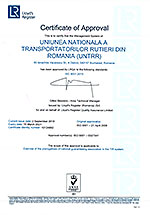PRESS RELEASE, January 6th, 2015: Quo vadis, the European Union? Germany imposes a minimum wage to the carriers of other Member States, joining the Western States which have adopted measures against freedom of services in the EU. Penalty for non-compliance with the minimum wage per hour in Germany can reach EUR 500.000!
PRESS RELEASE
January 6th, 2015
Quo vadis, the European Union?
Germany imposes a minimum wage to the carriers of other Member States, joining the Western States which have adopted measures against freedom of services in the EU. Penalty for non-compliance with the minimum wage per hour in Germany can reach EUR 500.000!
As of the 1st of January 2015, Germany is imposing a minimum wage of EUR 8.5 per hour which will be applicable to the foreign professional drivers carrying out international transport operations of goods and passengers to and from Germany, cabotage in or transiting Germany.
Thus, for each hour worked by a Romanian driver on Germany’s territory, the minimum wage per hour applied is that of Germany, not the Romanian one.
The comprehensive law regulating the minimum wage in Germany (MiLoG) – the original German version and its Romanian version can be seen here: old.untrr.ro.
For each trip operated by a Romanian driver on Germany’s territory, the Romanian haulier for whom he is working is obliged to notify through a written report the German Customs authorities. Although the law comes into force on the 1st of January 2015, German authorities did not issue so far clear and comprehensive information on how this law will be applied to foreign operators. We wonder if the law's provisions are applicable to non-EU citizens, such as a Turkish carrier leaving Turkey and transiting Germany since his destination is Netherlands.
To access Regulation on notification obligations in the transport sector and the latest updates from the German authorities, please see old.untrr.ro.
We consider that the recently adopted measures are seriously affecting the freedom of services on the European market and we express our concern with regard to the direction the European Union is heading to.
France has firstly raised a big question mark on the freedom of services within the EU - by introducing huge fines last year for the weekly rest time of professional drivers (taking the normal weekly rest period in the vehicle - 30,000 Euro fine, 1 year in prison bonus ) - fines being applicable rather to foreign carriers than resident transport companies!
Now, Germany takes a step alike, a different approach but, again, against freedom of services within the EU.
What is the purpose of these measures taken by Western Europe?
The aim of these new provisions imposed by the developed Western European States is to raise barriers for foreign competitors, especially those of Eastern Europe who are accused of social dumping, a term used more and more for justifying the recent protectionist measures adopted by the Western countries. However, the term of social dumping is wrongly used since the differences between Western European and Eastern European wages are not anti-competition practice but a consequence of different living and social standards between East and West.
Through the new regulation concerning the minimum wage per hour, the German Government is penalizing its own citizens and its own economy!
1. Germany will prejudice its own resident transport companies which will no longer be competitive as these companies will need German government’s protection under any circumstance, a fact that is not sustainable on a long term
2. The operational costs of all the other German companies will increase
3. The end result will be the increase of the living cost for all Germany’s citizens.
By this measure, the German government basically sacrifices the current advantages of the German companies and the German population to protect only a very limited number of employees of road transport companies - small and medium enterprises. Requiring that 98% of the population to pay more to support remaining 2% instead to find solutions to the 2% - this is a completely new and surprising approach.
The transport companies and drivers from Eastern Europe do not take the Westerners’ jobs, but do their jobs!
In the current European debate on social dumping and concrete measures taken by Germany in this respect through the new minimum wage law, it is even more surprising that Germany was also among the EU Member States that have applied last year for adoption of temporary digital cards for non-residents, thereby allowing citizens of Asia to enter the EU labor market with the most permissive Member States, but in the end going to work for most developed Member States such as Germany - as the current case of Filipino drivers!
Compared to these procedures, the Western Europe’s charges on social dumping are unexplained, criticizing the Eastern Europeans drivers and companies for lower wages - the average of 1.600-2.000 Euro / month, while the total cost for a driver working from Philippines in the EU for a period of six months is less than 1.000 Euro / month or 6.000 Euro / half-year - including airfare for 1000 Euro, 1000 Euro for 1 month training program to the driver before the work start and 500 Euro monthly salary. In the past two years, hundreds of drivers from Philipplines were employed by the German transport companies.
Why should we allow the Philippines drivers to come and work in the EU? To provide them a minimum wage of 8.5 euros per hour? Specifically, 180 hours of driving per month x 8.5 Euro / hour = 1530 Euro! Why the German state does not approach this issue through taxation and not try to make the profession more attractive?
Are so many German citizens interested in working as professional drivers and can not find work - only 8.5 Euro / hour?
Before the enforcement of such laws, it would be decent to have a realistic assessment of the impact. In the US, an NGO has opened to hiring a total of 12,000 jobs in agriculture and only 6 US citizens were employed as of 11 who applied! The result was that Mexicans come to work in the US on jobs that no US citizen is not interested!
An analysis conducted by German recruitment companies would also be advisable, on the job openings to hiring professional drivers over long distances – how many national and resident in Germany are interested in given these circumstances.
The message that the Western Europe should understand is that carriers and drivers from Eastern Europe do not take the Westerns’ jobs, but do their jobs!
Why does NOT Germany impose that all products sold in Germany are to be produced by workers paid by minimum 8.5 Euro / hour?
The end result throughout all these types of measures adopted by developed countries such as France and Germany, reported to the road transport industry, is a new "payment instrument" in exchange to the European regulations on access to the profession and especially the market - once regulations will be adjusted in a similar manner, the national rules will be canceled.
Through this approach, the EU is moving towards self-destruction. The EU is stronger when united and not divided, and it is very important to realize it before it is too late. We believe it is extremely important to understand how to implement these laws and which is their ultimate goal.
We warn that the application of such measures pushes Europe on a path of neo-protectionism which ultimately will affect its overall competitiveness over other global competitors!
* * *
The National Union of Road Hauliers from Romania (UNTRR) is an employers' and professional organization founded in 1990 on democratic principles, which promotes and protects nationally and internationally the interests of Romanian operators performing road transport of passengers and goods, recording from its foundation to the present over 13,000 members - operators carrying out domestic and international freight transport and passengers.


































